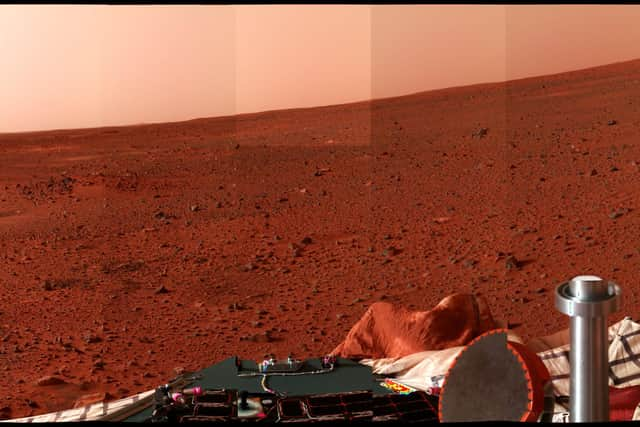Mars: 'Less than two dozen' people needed to build and maintain a colony on the Red Planet, researchers say
and live on Freeview channel 276
Around 22 people are enough to build and maintain a colony on Mars, a new study has suggested. It was previously estimated that around 100 people would be required to sustain a habitat on the planet.
In a yet-to-be peer-reviewed analysis, which was published on arXiv, a team of researchers from George Mason University in Fairfax, Virginia looked at previous studies that said anywhere between 100 to 500 people may be needed for a self-sustaining Mars colony.
Advertisement
Hide AdAdvertisement
Hide Ad

They also took into account human social and psychological behaviour, as well as the continuity of interactions between people to make a new estimate. Over 28 years, the team ran five different models as the researchers used a computer simulation, known as agent-based modelling, to give various simulated colonists a variety of attributes - with population sizes in the simulation ranging from 10 to 170.
The attributes given ranged in factors such as metabolism, resilience, skills and their levels, and stress, as well as taking into account one of four psychological traits – neurotic, reactive, social, or agreeable. They then were set to task, taking care of the various responsibilities of a full-blown Mars colony.
They could sleep, move, interact with each other and produce or consume resources, as well as lose health and may die and get removed from the simulation without enough resources. Their findings reveal that just under two dozen people, 22, may be enough to build and sustain a space colony on Mars.
Co-author Anamaria Berea, associate professor of computational and data sciences at George Mason University, told The Register: "We tend to often treat humans as just numbers or particles devoid of personal incentives, heterogeneity and adaptability. Human groups are complex systems where the outcome is not the sum of its parts, but synergistic," she added. "Any social system exhibits properties of adaptability, emergence, and non-linear dynamics."
Advertisement
Hide AdAdvertisement
Hide AdThe team also considered a close "relationship between Earth and the habitat on Mars," meaning that such a colony likely wouldn't be independent," as Berea explained. "The scenario where you can simply send X number of people somewhere and just let them survive is very unlikely," she said, "also because it actually costs much more to send tens and hundreds of people into space than sending resupply shuttles."
However, they did find that the number of "neurotics" sent to the colony needed to be kept to an absolute minimum. "Martians with the 'neurotic' psychology die at a much higher rate than those of other psychologies, and once their population reaches a low enough level, the settlement population stabilizes," the paper reads.
The Red Planet’s inhospitable nature also requires any habitat built there to be largely self-sustaining, scientists say. Apart from mining a few basic minerals and water, future Mars settlers will be dependent on Earth resupply as well as in-situ replenishment of necessities using advanced technology such as splitting Martian water into oxygen for breathing and hydrogen for fuel.
Comment Guidelines
National World encourages reader discussion on our stories. User feedback, insights and back-and-forth exchanges add a rich layer of context to reporting. Please review our Community Guidelines before commenting.
